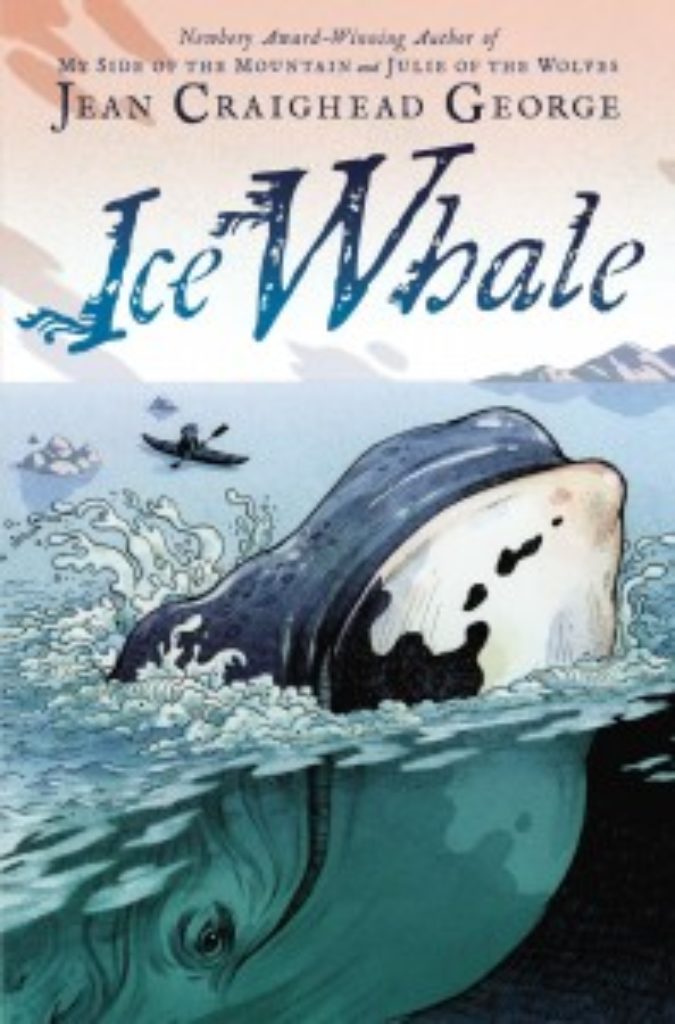Ice Whales by Jean Craighead George has been reviewed by Focus on the Family’s marriage and parenting magazine.

Ice Whales by Jean Craighead George has been reviewed by Focus on the Family’s marriage and parenting magazine.
In 1848, an Eskimo boy named Toozak watches as a bowhead whale is born. He names the whale Siku and believes the Great Spirit has bestowed an honor upon him by allowing him to witness this event. Siku is easy to recognize because of a distinctive white spot on his chin resembling a dancing Eskimo.
Years later, when Toozak is 20, he inadvertently guides a group of American hunters to the whales in his area. After the white men kill many whales, the town shaman tells Toozak that he’s angered the spirits and must pay by protecting Siku. Toozak’s family will not be free of this curse until Siku dies or saves one of Toozak’s offspring. Toozak leaves his home on the Russian island of St. Lawrence, seeking to learn all he can about whales and how to protect Siku. His journey takes him north to Alaska, with many stops along the way. He eventually marries and has a son of his own.
The novel introduces more than a dozen generations of Toozaks. Readers also meet generations of an American maritime family named Boyd. Toozaks, Boyds and Siku himself tell how the ocean changes and warms over the decades. Readers witness shifts in the Eskimo culture due to the natives’ interactions with white men. The world increasingly demonstrates concern for the whale population.
In 1980, Emily Toozak is lost at sea. Siku pushes the ice on which she rests to shore and saves her life, breaking the Toozak curse. Emily meets and marries Will Boyd. Their son, Agvik, carries on their tradition of environmental consciousness. The author imagines the same ocean in 2048. Eskimos still hunt whales out of necessity only. Captain Agvik is whale hunting on behalf of the Eskimo community when he spots Siku. He senses that Siku, now around 200 years old, wants to offer himself to the community. Agvik tells Siku to go and watch over Agvik’s people and the other whales, since they are all one. Agvik and his crew bring home another whale instead.
A whaling captain thanks his Maker when he sees whales in the sea. In 1946, a minister sprinkles Charlie Toozak the fifth with holy water, and Charlie becomes a Christian. Charlie hopes this act will destroy the shaman’s curse on his family, but he still hears the voices of his ancestors urging him to protect Siku. One Boyd captain tells his son that whalers of the past depleted the whale population. Though whaling is no longer an industry, he explains, Eskimos still kill whales to provide needed resources for entire communities. Emily wishes the Lord’s guidance to a crew preparing to leave on a sea expedition.
Toozak believes the Great Spirit allowed him to witness the birth of a whale. The town shaman tells him he has upset the Whale Spirts, and they will bring bad fortune upon him. Toozak argues that his having witnessed a whale birth should count for something. The shaman tells him that because of this, he will be spared a bit.
In the shaman’s home, Toozak can feel the spirits all around him. The shaman chants and uses magic to discern that the spirits want Toozak to protect Siku. Toozak’s sister has given him a sable to wear when he leaves Russia, and he is convinced there are good spirits in it. When 33 ships are crushed in the ice during the Disaster of 1871, the Eskimos believe it is the ocean’s revenge against the whalers for killing whales for money rather than food.
Emily Toozak is convinced Siku has saved her and that because of their spiritual bond, he continues to guide her while she’s lost. She tells Siku’s spirit she knows she’ll be all right because he is with her. She sings a song about how Siku is her spirit person, how they flow through each other and how Siku has made the plants and animals part of them both. She later looks around at nature and reiterates that she is a part of everything. The narrator suggests that millions of years of evolution have allowed the whales to adapt to the frigid conditions.
Toozak’s parents are sad to see him go and give him all the supplies he needs. Fathers and grandfathers in the Toozak and Boyd families pass down their love of the sea and share stories of Siku through the generations.
None
An Eskimo father lets Toozak climb into bed with his daughter. According to the ancient tradition, this means they are married.
Get free discussion questions for this book and others, at FocusOnTheFamily.com/discuss-books.
Alcohol: White traders barter with liquor. This sometimes means the Eskimos get too drunk to hunt and their families starve in the process. The town shaman gets drunk, causing Toozak to wonder if the man really has powers. In the 1870s, the whalers teach the Eskimos to make alcohol, which leads to starvation and the collapse of villages. Koozak thinks alcohol must be an evil thing if it makes people stop caring about the land and the animals.
You can request a review of a title you can’t find at [email protected].
Book reviews cover the content, themes and worldviews of fiction books, not their literary merit, and equip parents to decide whether a book is appropriate for their children. The inclusion of a book’s review does not constitute an endorsement by Focus on the Family.